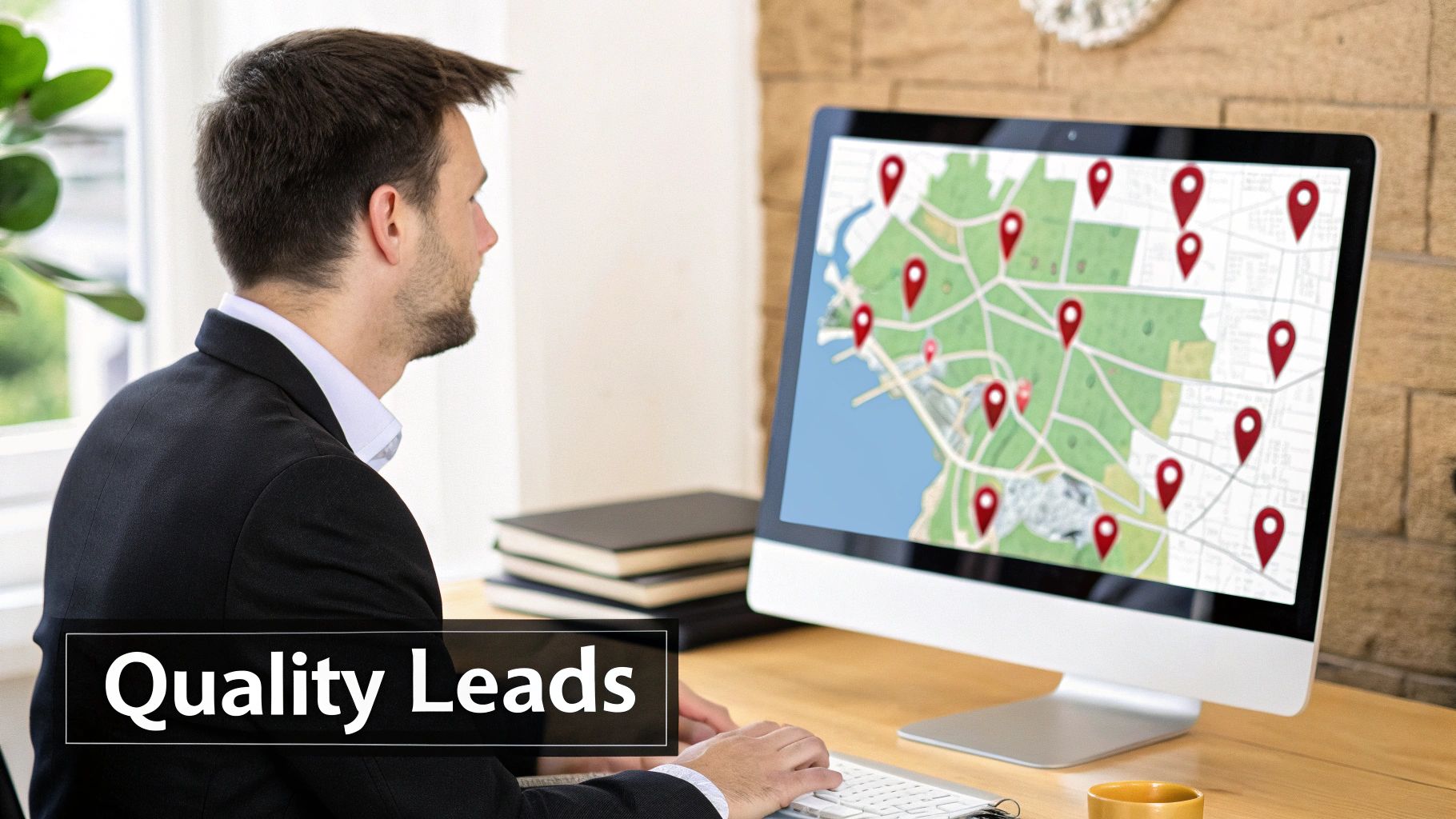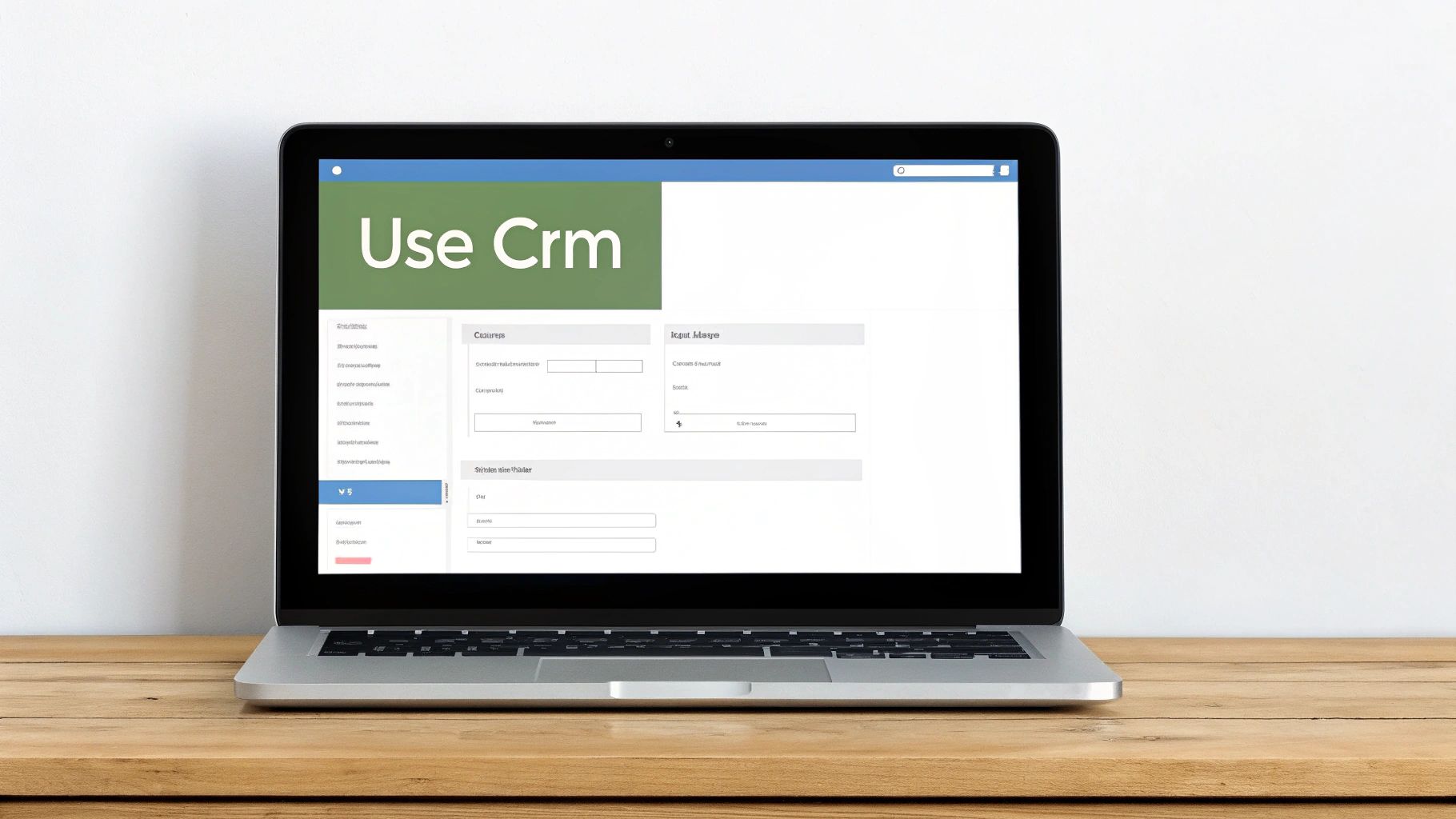Convert Real Estate Leads: Proven Strategies for Success
The Golden Window: Why Response Time Changes Everything

In real estate, timing is critical, especially for converting leads. That first contact is a golden opportunity. But just how valuable is a quick response? The difference between minutes and hours can drastically change your success rate.
The Power of Immediate Connection
Imagine a hot air balloon taking flight. Initially, it's easily influenced by the wind. A quick response to a lead is like that guiding wind, steering the balloon towards closing. A delayed response, however, lets the balloon drift aimlessly, potentially losing the sale.
This isn't just a metaphor. Response speed is crucial for converting real estate leads. Studies show that contacting leads within five minutes significantly increases engagement.
The Five-Minute Advantage
Leads contacted within five minutes are 100 times more likely to engage than those contacted after an hour. AI calling systems can help achieve this rapid response by qualifying leads and maintaining engagement, a particularly useful tactic in competitive markets. For more detailed statistics, learn more about converting real estate leads.
Let's take a closer look at the impact of response time:
Response Time Impact on Lead Engagement
| Response Time | Likelihood of Engagement | Competitive Advantage |
|---|---|---|
| Within 5 Minutes | 100x higher than 1 hour | Significant – Captures highly engaged leads |
| After 1 Hour | 100x lower than 5 minutes | Low – Lead interest likely waning |
| After 24 Hours | Minimal | Almost none – Lead likely pursued other options |
This table clearly illustrates the importance of responding quickly. The faster you connect, the higher your chances of engagement and the greater your competitive edge.
Systems for Speed: How Top Agents Stay Responsive
Top agents understand the importance of the "golden window." They implement systems to maintain fast response times, even when busy. Here's how:
-
Automated Responses: Personalized, empathetic automated messages acknowledge the lead's inquiry and set expectations for a detailed follow-up.
-
Prioritized Scheduling: These agents dedicate specific time blocks for immediate follow-up, focusing on peak lead times.
-
Delegation and Teamwork: Using assistants or team members to manage initial contact ensures no lead is overlooked.
Overcoming Response Barriers
Many agents struggle with quick responses due to showings or client meetings. Successful agents anticipate these hurdles and find solutions. They might use mobile CRMs for on-the-go access or pre-written message templates to save time.
The Psychology of Immediate Contact
Why is immediate contact so effective? It triggers several psychological factors. A prompt response shows professionalism, attentiveness, and genuine interest. This builds trust and rapport, making leads more receptive to further communication and showing you value their time and are ready to help.
Understanding the Real Numbers Behind Lead Conversion

Let's talk frankly about converting real estate leads. It's not about chasing unrealistic goals, but about understanding the metrics that truly matter. This means focusing on the numbers that drive actual business growth, not just vanity metrics.
Decoding Conversion Benchmarks
Conversion benchmarks in real estate aren't universal. They change based on several factors. Your lead source, for example, plays a significant role. A referral is more likely to convert than a lead from a cold online advertisement.
Price point and market conditions also influence your conversion rate. Luxury properties and slower markets typically have longer conversion timelines.
Real estate lead conversion rates are generally low due to the complexity and financial weight of these transactions. On average, these rates range from 1% to 3.5%. A study by Ruler Analytics found the average conversion rate is about 2.4%. This shows that building trust and relationships is a critical, time-consuming process. For more detailed statistics, check out this resource: Real Estate Lead Generation Statistics.
The Value of "Low" Conversion
Don't be discouraged by seemingly low conversion rates. Even a small percentage can translate into substantial revenue, especially in real estate. Imagine generating 100 leads per month. A 2% conversion rate equates to two closed deals. In a high-value industry like real estate, those two deals can have a significant impact on your bottom line.
For new agents looking to enhance their skills, this article might be helpful: Real Estate Training for New Agents.
Calculating Your Cost Per Acquisition
Understanding your Cost Per Acquisition (CPA) is vital. This metric reveals how much you spend to acquire each new client. If you invest $500 in marketing and gain one client, your CPA is $500. By tracking your CPA across various lead sources, you can identify which channels offer the best return on investment and optimize your budget.
Identifying High-Quality Leads
Not all leads are equal. Some sources consistently provide higher-quality prospects, resulting in shorter sales cycles and increased conversion rates. Referrals, for instance, often come pre-qualified with established trust.
The following table provides a comparison of average conversion rates across different lead generation channels:
Real Estate Lead Conversion Rates by Source
| Lead Source | Average Conversion Rate | Time to Conversion | Cost Per Conversion |
|---|---|---|---|
| Referrals | 10-15% | Short | Low |
| Paid Advertising | 1-3% | Medium | Medium-High |
| Organic Search (SEO) | 2-5% | Long | Medium-Low |
| Email Marketing | 2-4% | Medium | Low-Medium |
This table illustrates how significantly conversion rates, time to conversion, and cost per conversion can differ based on the lead source. While referrals generally boast the highest conversion rates and shortest time to convert, they aren't always scalable. Paid advertising can offer a wider reach, but with higher associated costs and longer conversion timelines.
Building Your Conversion Framework
Tracking your personal conversion metrics is crucial for ongoing improvement. Create a simple framework that focuses on key stages of your conversion funnel. This could include:
- Leads generated
- Leads contacted
- Appointments scheduled
- Deals closed
By analyzing these numbers, you can identify areas for improvement and refine your strategy. This targeted optimization will lead to more efficient lead conversion and, ultimately, greater success.
Building Trust When Clients Are Naturally Skeptical

In today's real estate market, earning client trust is essential. Buyers and sellers face a constant barrage of information, leading to a healthy dose of skepticism. Breaking through this requires understanding how clients make decisions and communicating effectively.
Understanding Client Psychology
Real estate decisions are big ones. They involve significant financial investments and often carry a heavy emotional weight. Clients aren't just evaluating houses; they're also sizing up their agent. Building a strong rapport is crucial. Clients want an advisor who understands their needs and prioritizes their best interests. This is especially important when working with new leads.
Effective Communication Techniques
Becoming a trusted advisor requires strategic communication. Active listening is key. Understanding client motivations and concerns allows you to address unspoken anxieties and tailor your approach. This demonstrates a commitment to finding the right fit, not just closing a deal. For more insights, check out our guide on How to Master Agent Mentorship.
Questioning Frameworks for Uncovering Needs
Using specific questioning techniques can reveal client motivations. Open-ended questions encourage detailed responses. These provide valuable insights into priorities like location, budget, and desired features. This information helps shape recommendations and demonstrates that you're actively working for their individual needs.
Addressing Unspoken Concerns
Clients may hesitate to voice concerns, especially when they feel pressured. Directly addressing common anxieties like market fluctuations or financing complexities builds confidence and transparency.
Tailored Communication Strategies
Every client is different. Some prefer data-driven analysis, while others connect with emotional appeals. Recognizing these nuances allows you to personalize your message and build stronger relationships.
Common Scenarios That Impact Trust
Simple things can make or break trust. A slow response to an inquiry can signal disinterest. Conversely, being readily available and proactive in communication builds rapport and demonstrates reliability.
Practical Examples of Trust-Building Communication
Here’s a quick look at different communication strategies tailored to specific client profiles:
| Client Profile | Communication Strategy |
|---|---|
| Analytical | Provide data-driven market reports and property comparisons. |
| Emotional | Focus on the lifestyle benefits of the property and the surrounding community. |
| Skeptical | Offer testimonials, case studies, and third-party validations. |
| Hesitant | Proactively address potential concerns and provide reassuring solutions. |
By mastering the art of building trust through effective communication and understanding client psychology, you'll significantly improve your ability to convert leads and build lasting client relationships. This positions you not as just a salesperson, but as a valuable partner in their real estate journey.
Leveraging Technology That Actually Converts Leads

Today's top-performing real estate agents are going beyond the standard CRM. They're using a powerful suite of tech tools to maximize lead conversion. These tools aren't just fancy gadgets; they're strategic investments that improve workflows and boost bottom-line results. This allows agents to prioritize building relationships, leaving the repetitive tasks to automation.
Essential Tools and Integrations for Conversion
Effective technology blends personalized follow-up with smart automation. This powerful combination nurtures leads without losing the personal connection.
-
CRM Integrations: Linking your CRM with other platforms, such as your email marketing software, creates a smooth flow of information. Automated email sequences can be triggered by specific lead actions, creating a streamlined and efficient process.
-
Automated Email Sequences: Consistent communication is vital for lead nurturing. Automated emails deliver valuable content and keep you top-of-mind with potential clients. Think of it as a steady drip of valuable information, nurturing leads over the long term. For more in-depth automation strategies, check out this guide on real estate marketing automation.
-
Text Automation: In our fast-paced world, text messaging provides instant connection. Automated texts can be used for appointment confirmations, property updates, or simply checking in. This demonstrates responsiveness and builds rapport.
-
AI Assistants: AI can handle time-consuming administrative tasks like scheduling showings or answering frequently asked questions. This frees up agents to focus on high-value interactions that require a personal touch. Think of these virtual assistants as an extra set of hands, helping you manage more leads efficiently.
ROI vs. Expensive Distractions: Choosing the Right Tech
Not every new piece of tech is a worthwhile investment. Successful agents choose technologies that directly improve their conversion rates. They understand that effective implementation and strategic use are more important than simply having the newest gadgets.
-
Focus on Functionality: Prioritize tools that address specific challenges in your conversion process. Ask yourself if the tool helps you respond quicker, nurture leads more effectively, or streamline communication.
-
Scalability: Select platforms that can grow with your business. This prevents future headaches and costs associated with switching systems as your lead volume increases.
Systems That Work While You Sleep: Automating for Success
Imagine a system that nurtures leads 24/7, even while you're not working. The right automation tools and strategies can make this a reality. Your business can essentially run on autopilot, maximizing both efficiency and conversions.
-
Lead Segmentation: Grouping your leads based on their individual needs and behaviors allows you to tailor your messaging and offers, resulting in increased engagement.
-
Targeted Content Delivery: Sharing relevant content with each segment provides value and positions you as a knowledgeable expert. A first-time homebuyer has different needs than an experienced investor, and your content should reflect that.
-
Automated Follow-Up: Consistent follow-up is essential for lead conversion. Automated systems ensure no lead is overlooked, keeping you at the forefront of their minds.
Practical Setup Guides and Case Studies
Implementing these systems is achievable, even for those who aren't tech-savvy. Many platforms offer intuitive interfaces and helpful support resources. Real-world case studies offer valuable insights and can be a source of inspiration. These resources empower agents to utilize technology and transform their lead conversion process. Many of these studies showcase before-and-after conversion metrics, demonstrating the real impact technology can have. Agents looking to create a structured business plan can utilize this helpful real estate agent business plan template.
Creating a Lead Nurturing System That Never Sleeps
Most real estate leads aren't ready to buy or sell today. This makes lead nurturing essential for converting those leads into clients. Think of it like cultivating a garden: you wouldn't plant a seed and expect a ripe tomato tomorrow. Relationships with potential clients need similar care to truly blossom. This section explores building a system to nurture leads over time, turning casual inquiries into closed deals.
Segmenting Your Leads: A Targeted Approach
Effective nurturing starts with understanding your audience. Not all leads are the same. Some actively search for properties, while others are just beginning to consider their options. Lead segmentation lets you tailor your communication to each group’s specific needs.
-
Timeline: Categorize leads by their planned purchase or sale timeframe. Are they looking to move in the next few months, or further down the line?
-
Motivation: Understand their driving factors. Are they relocating for a job, needing a larger home, or downsizing? You might find this helpful: How to master your real estate business plan.
Segmenting leads based on these factors allows you to deliver relevant, resonant information, significantly increasing your conversion chances.
Content That Converts: Providing Genuine Value
Nurturing isn't about relentless sales pitches. It’s about building trust and positioning yourself as a valuable resource. One effective method is real estate marketing automation. Focus on content that educates, informs, and addresses common buyer and seller concerns.
-
Market Updates: Offer insights into local trends, including recent sales data and property value fluctuations.
-
Homeowner Tips: Provide helpful advice on home maintenance, staging, or financing.
-
Neighborhood Guides: Showcase the best local community features, highlighting schools, restaurants, and attractions.
This value-driven approach establishes you as an expert advisor, not just a salesperson. When leads are ready to act, you'll be their first choice.
Recognizing Buying Signals: Knowing When to Act
Effective nurturing isn't just staying in touch; it's recognizing when a lead is ready for a direct conversation. Watch for these buying signals:
-
Increased Engagement: Are they opening emails more often or clicking property listings?
-
Specific Questions: Are they asking detailed questions about financing or closing costs?
-
Requesting Showings: This signifies serious interest and a strong conversion opportunity.
These signals show a lead moving from information-gathering to decision-making. This is your cue to transition from nurturing to actively selling.
Maintaining the Connection: Templates for Effective Follow-Up
Consistency is crucial. Here are some templates to keep you engaged without overwhelming your leads:
-
Email: "Hi [Lead Name], Sharing the latest market update for [Neighborhood]. Let me know if anything interests you!"
-
Text: "Checking in – any questions about the home buying process? Happy to chat when you're free."
-
Value-Driven Check-in: "Saw this article about [Home Improvement Tip] and thought of you. Hope it helps!"
Regular, valuable communication builds rapport and keeps you top-of-mind. This consistent connection turns leads into loyal clients.
Capitalizing on Market Opportunities Others Miss
While many real estate agents focus on traditional methods for finding new clients, the most successful agents understand the need to adapt. Converting real estate leads isn't about following a script. It's about recognizing emerging trends and finding those underserved niches. This proactive approach sets top performers apart.
Identifying Underserved Niches
Think of the real estate market as a vast ocean. Many agents fish in the same crowded areas. But by identifying underserved niches, you can find calmer, more productive waters. This might involve specializing in first-time homebuyers, focusing on eco-friendly properties, or catering to a specific demographic with unique needs. This targeted approach lets you tailor your marketing and communication, leading to higher-quality leads.
Adapting to Market Shifts
The real estate market is always changing. Like a surfer, you must adapt to stay ahead of the wave. This means understanding current trends, anticipating future shifts, and adjusting your conversion strategies. For example, in a buyer's market, you might emphasize your negotiation skills to secure the best possible deals. In a seller's market, highlighting your marketing expertise and ability to maximize sale prices becomes crucial. This adaptable approach lets you offer the most relevant value, regardless of market conditions.
The Power of Specialized Expertise
Developing specialized expertise strengthens your position. Becoming the go-to expert in a particular area—like investment properties or luxury real estate—attracts motivated leads seeking specialized knowledge. This establishes you as a trusted advisor and increases your conversion potential.
The global real estate market continues expanding, offering numerous opportunities. Projections for 2025 indicate further growth across various regions. Explore this topic further. This growth allows agents to use advanced lead generation strategies. For instance, digital marketing tools like video content can increase qualified leads by up to 49%. Effective email marketing campaigns can achieve open rates of 15-28% and click-through rates of 2.5-5%.
Practical Market Analysis Methods
Analyzing market conditions is key to informing your conversion strategy. Stay up-to-date on local market data, track inventory levels, and monitor pricing trends. These insights allow you to tailor your communication and demonstrate your expertise to potential clients. You can also identify emerging opportunities before your competitors, giving you a distinct edge. By constantly analyzing the market, you can predict shifts, identify underserved niches, and adapt your approach, ultimately maximizing your lead conversion potential.
Measuring What Matters: Optimizing Your Conversion Approach
Converting real estate leads isn't about luck; it's about a systematic approach refined through consistent measurement and optimization. Top-performing agents understand the importance of analyzing their conversion process to identify strengths and weaknesses. This goes beyond simply tracking lead volume. It requires a deep dive into the metrics that genuinely drive business growth.
Key Metrics for Conversion Success
Successful agents monitor specific metrics to pinpoint areas for improvement. This includes tracking lead source effectiveness. Understanding conversion rates across different channels is also critical. Finally, calculating the all-important cost per acquisition helps agents understand their return on investment. For example, tracking how many leads convert from online portals versus referrals can reveal valuable insights. This data-driven approach empowers agents to make informed decisions and refine their strategies.
A/B Testing: Refining Your Approach
A/B testing is a powerful tool for real estate agents. Experiment with different follow-up messages. Vary your timing strategies and test various communication channels. This helps determine what resonates best with your target audience. For example, compare the effectiveness of a text message follow-up versus a phone call. This simple experiment can uncover valuable insights into client preferences and optimize your communication strategy. To further refine your approach, consider exploring techniques for effective conversion rate optimization.
Gathering Feedback: Learning from Every Interaction
Learning from both successes and failures is crucial. Gather feedback from converted clients to understand what contributed to their positive experience. Equally important is analyzing lost opportunities. Pinpoint areas where the conversion process could be improved. This might involve surveying past clients or simply having open conversations. These insights can reveal valuable information about client preferences and help refine your approach for future interactions.
Implementing Change: Turning Insights into Action
Data and feedback are only useful if they lead to actionable change. Implement changes based on your findings. This might involve adjusting your messaging, optimizing your follow-up process, or even re-evaluating your target audience. This iterative approach ensures continuous improvement and maximizes your chances of converting leads into clients.
Conversion Funnel Audits: Regular Checkups for Your Business
Regular conversion funnel audits are essential for your business. They help identify and address any bottlenecks or inefficiencies in your lead conversion process. This ongoing monitoring and refinement are key to staying competitive and consistently converting leads into closed deals.
Are you ready to transform your real estate business? Visit Ashby Graff Careers today to learn more about how we empower agents with the tools, training, and support they need to succeed.






